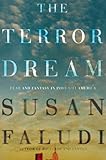Terror dream: fear and fantasy in post -9/11 America
Material type: TextPublication details: New York; Metropolitan Books; 2007Description: 351pISBN:
TextPublication details: New York; Metropolitan Books; 2007Description: 351pISBN: - 9780805086928
- 303.620973 FAL
| Item type | Current library | Call number | Status | Date due | Barcode | Item holds |
|---|---|---|---|---|---|---|
|
|
Gandhi Smriti Library | 303.620973 FAL (Browse shelf(Opens below)) | Available | 148597 |
Browsing Gandhi Smriti Library shelves Close shelf browser (Hides shelf browser)

|

|

|

|

|

|

|
||
| 303.6209549 GUL Al Qaeda connection: Taliban and terror in Pakistan's tribal areas | 303.62095491 GUN Pakistan: terrorism ground zero | 303.62095496 SAP Ten years of upheaval: reportage of the decade long Maoist people's war in Nepal | 303.620973 FAL Terror dream: fear and fantasy in post -9/11 America | 303.620973 TAM Terrorism and national security reform: how commissions can drive change during crisis | 303.623 ANA Scorched white lilies of '84 | 303.623 GOR Gordon riots: politics, culture and insurrection in late eighteenth century Britain |
From the Pulitzer Prize-winning journalist and bestselling author of Backlash--an unflinching dissection of the mind of America after 9/11.
In this most original examination of America's post-9/11 culture, Susan Faludi shines a light on the country's psychological response to the attacks on that terrible day. Turning her acute observational powers on the media, popular culture, and political life, Faludi unearths a barely acknowledged but bedrock societal drama shot through with baffling contradictions. Why, she asks, did our culture respond to an assault against American global dominance with a frenzied summons to restore "traditional" manhood, marriage, and maternity? Why did we react as if the hijackers had targeted not a commercial and military edifice but the family home and nursery? Why did an attack fueled by hatred of Western emancipation lead us to a regressive fixation on Doris Day womanhood and John Wayne masculinity, with trembling "security moms," swaggering presidential gunslingers, and the "rescue" of a female soldier cast as a "helpless little girl"?
The answer, Faludi finds, lies in a historical anomaly unique to the American experience: the nation that in recent memory has been least vulnerable to domestic attack was forged in traumatizing assaults by nonwhite "barbarians" on town and village. That humiliation lies concealed under a myth of cowboy bluster and feminine frailty, which is reanimated whenever threat and shame looms.


There are no comments on this title.